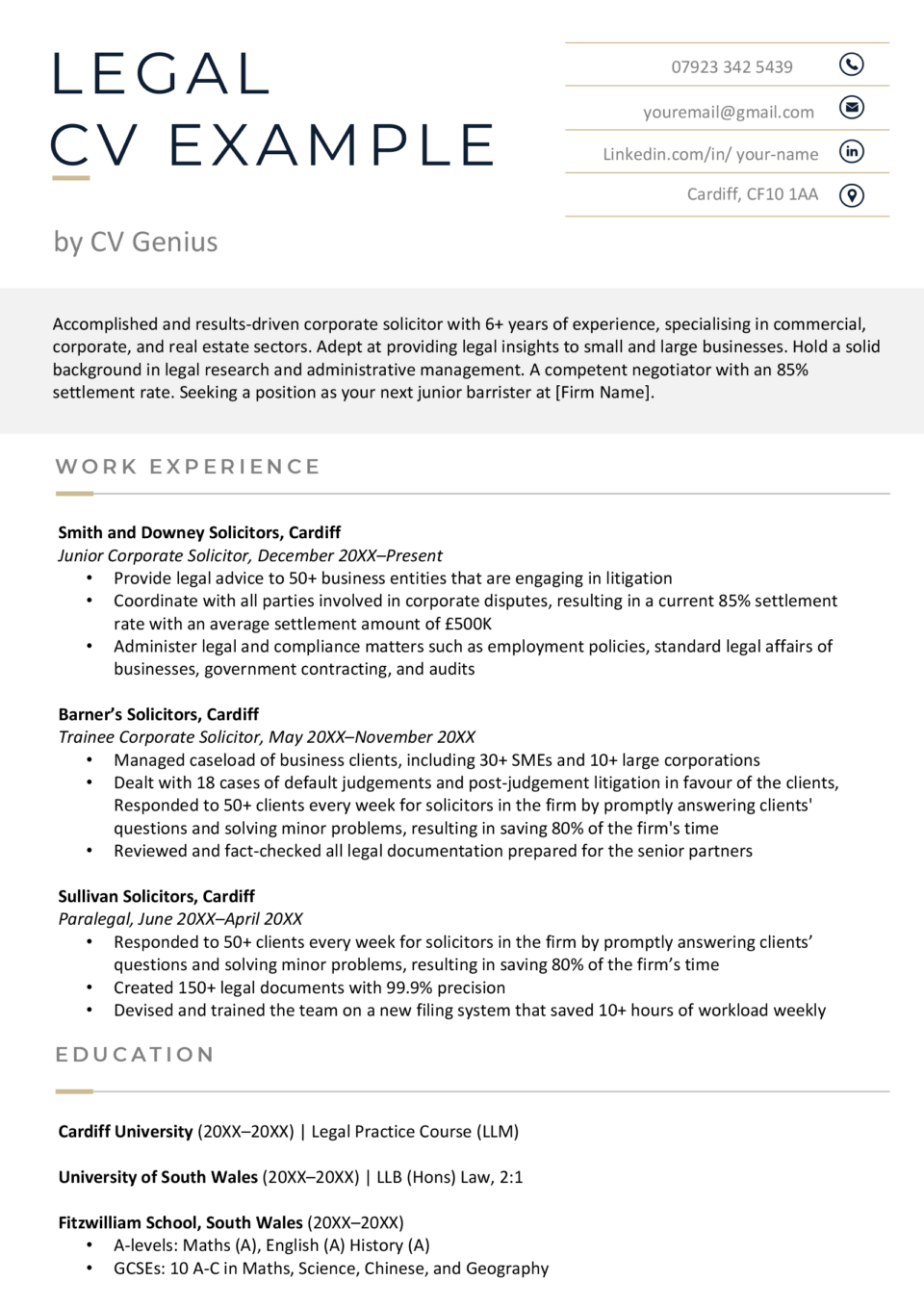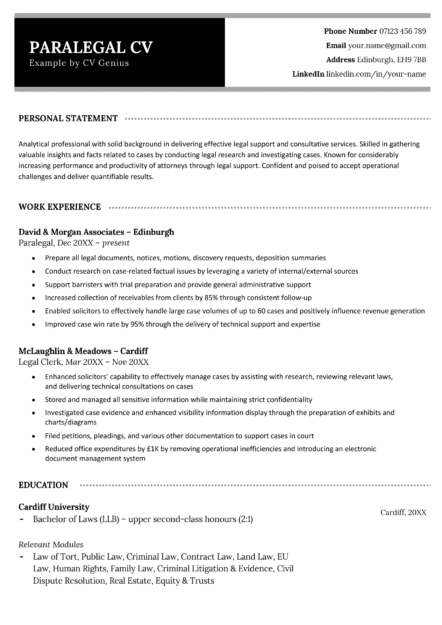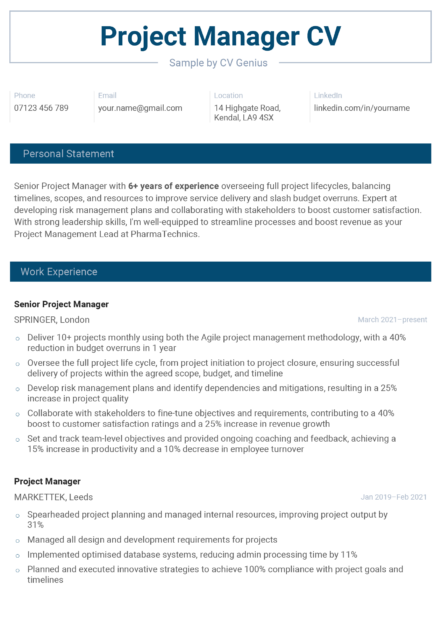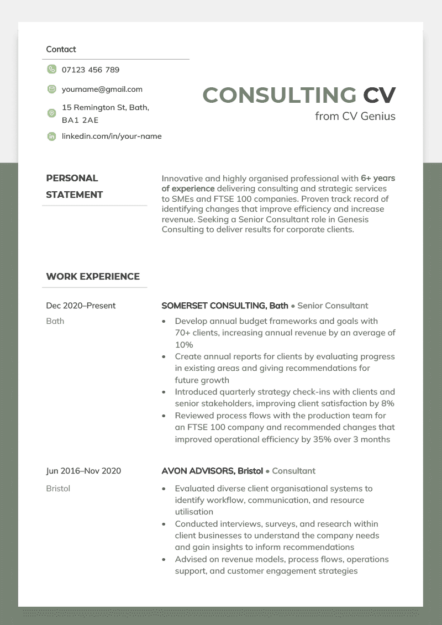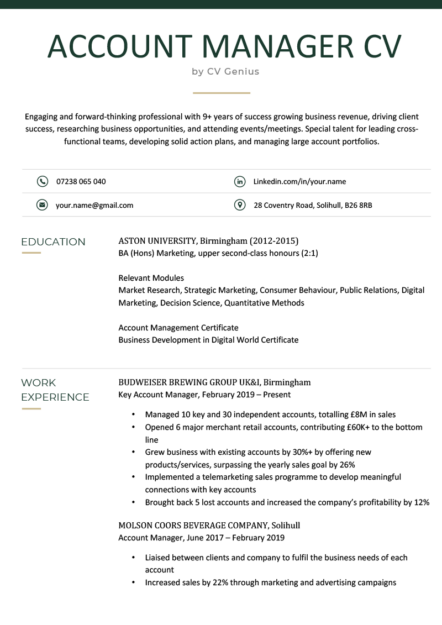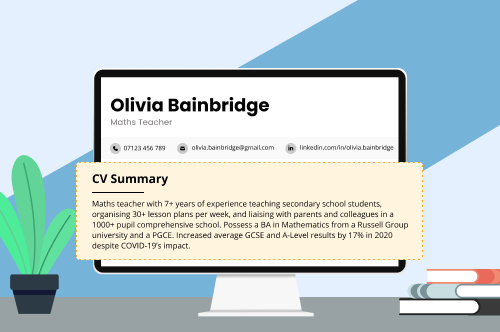Ensure your CV layout is structured to best highlight your unique experience and life situation.
Legal CV Template (Text Format)
Accomplished and results-driven corporate solicitor with 6+ years of experience. Adept at providing legal insights to small and large businesses. Hold a solid background in legal research and administrative management. A competent negotiator with an 85% settlement rate. Seeking a position as your next junior barrister at [Firm Name].
WORK EXPERIENCE
Smith and Downey Solicitors, Cardiff
Junior Corporate Solicitor, December 20XX–present
- Provide legal advice to 50+ business entities that are engaging in litigation
- Coordinate with all parties involved in corporate disputes, resulting in a current 85% settlement rate with an average settlement amount of £500K
- Administer legal and compliance matters such as employment policies, standard legal affairs of businesses, government contracting, and audits
Barner’s Solicitors, Cardiff
Trainee Corporate Solicitor, May 20XX–November 20XX
- Managed caseload of business clients with an average value of £5 million, including 30+ SMEs and 10+ large corporations
- Dealt with 18 cases of default judgements and post-judgement litigation in favour of the clients, including a high-profile case where we successfully overturned a £500,000 default judgment against a small business
- Reviewed and fact-checked all legal documentation prepared for the senior partners
Sullivan Solicitors, Cardiff
Paralegal, June 20XX–April 20XX
- Responded to 50+ clients every week for solicitors in the firm by promptly answering clients’ questions and solving minor problems, resulting in saving 80% of the firm’s time
- Created 150+ legal documents with 99.9% precision
- Devised and trained the team on a new filing system that saved 10+ hours of workload weekly
EDUCATION
Cardiff University (20XX–20XX)
Legal Practice Course (LLM)
University of South Wales (20XX–20XX)
LLB (Hons) Law, 2:1
Fitzwilliam School, South Wales (20XX–20XX)
A-levels: Maths (A), English (A) History (A)
GCSEs: 10 A–C in Maths, English, and IT
KEY SKILLS
- Legal procedure
- Legal research
- Employment law
- Finance knowledge
- Settlement
- Litigation
- Negotiation
- Oral communication
- Critical thinking
- Research
- Ethics
- TimeSolv, Clio, LEAP
HOBBIES & INTERESTS
- Law blogging
- Volunteering
- Attending law seminars
How to write a legal CV
Before you begin writing, make sure you know how to write a CV in a way that best emphasises your strengths.
In law, precision and accuracy are top priorities, so your legal CV should demonstrate your best qualities in a professional manner.
To help you ensure your application lands you an interview, here are three tips for making a job-winning legal CV (by the way, you’ll need to create a cover letter to go with your CV).
1. Begin with a compelling legal profession personal statement
Your personal statement sits at the top of your CV and summarises your professional career and objectives. If your target employer’s looking through dozens of applications, your CV personal statement is your chance to catch their attention and persuade them to keep reading your CV.
Your legal CV personal statement needs to be concise but also answer the main questions employers might have about you.
Create your personal statement after writing the other sections of your legal CV. With all of your potential, skills, experiences, and positive traits fresh in your mind, it’ll be easier to decide which of these to highlight in your personal statement.
A structured approach can help you make sure you cover the most relevant aspects of your legal career in a short paragraph.
- First, briefly introduce your professional profile. Include your years of experience and areas of legal expertise, and use powerful words like ‘accomplished’, ‘client-focused’, ‘dedicated’, or ‘experienced’ to make your profile engaging.
- Then, detail what you can contribute to the company. Summarise your achievements, so your employer can see what makes you a top candidate.
- Finally, conclude with statements expressing your career aims. Show you’ve paid attention to the job ad and done your research by adding a detail that’s specific to their firm.
Here’s an example of a concise but powerful legal CV personal statement:
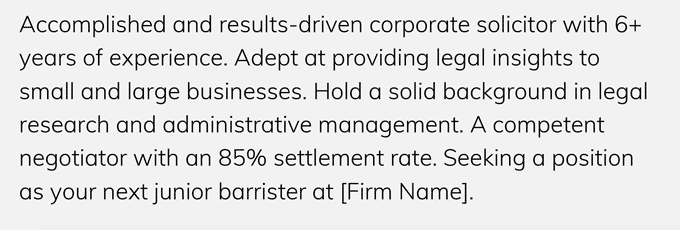
2. Highlight your legal CV skills
The skills section of your CV is where you can showcase your legal skills and abilities. Employers look at the skills on your CV to see what they can expect you to achieve with their business.
Your hard skills are abilities you’ve acquired during your law degree, training, and work experience. Listing your hard skills on your legal CV tells your employer at a glance what technical tasks you can perform.
Some hard skills to include on your legal CV are:
- Litigation support software (e.g., Capterra, SelectLegal, and HMCTS)
- Accounting support software, such as Quickbooks
- Cloud-based sharing software
- Database management systems like Microsoft Access
- Word processing software (e.g., Microsoft Word and Google Docs)
Soft skills are professional qualities related to your character. Soft skills are critical because they affect how you win clients’ trust, persuade your opposition, and collaborate with your colleagues.
Here are some examples of soft skills in the legal profession:
- Communication skills
- Social skills
- Critical thinking skills
- Problem-solving skills
- Interpersonal skills
You can highlight your soft skills and how they contribute to the legal profession by presenting some in your work experience section.
See below how our applicant provides a clear example of their time management skills:
- Responded to 50+ clients every week for solicitors in the firm by promptly answering clients’ questions and solving minor problems
3. Create a persuasive legal work experience section
Your work experience on a CV in the legal industry should highlight that you understand the job, the work environment, and what your employer expects from you. Show you’ve got the best background for the role with a properly formatted and well-written work experience section.
To refine your legal CV work experience section, follow these three steps:
- List your work experience in reverse order, with your current job first. Then, begin each with the job title, company name, location, and dates.
- Use 3–5 CV bullet points under each job heading to list what you achieved and begin each one with CV action verbs like ‘develop’, ‘prepare’, ‘file’, ‘direct’, ‘coordinate,’ ‘investigate’, ‘monitor’, ‘negotiate’, ‘arbitrate’, and ‘resolve’.
- Give specific examples of projects you worked on, including hard numbers (settlement values, case volumes, etc.) to show your effectiveness in the job.
By quantifying your most relevant achievements first, you give your target employer a clear picture of how you’ll perform in their firm.
Here’s an example from the work experience section of a junior barrister’s CV:
Example of a junior barrister's work experience bullet points
Junior Barrister, 2017–Present
Parkhouse Chambers, Cambridge
- Directed 40 case files from consultation, filing, trials, and appeals
- Developed a physical and digital filing system that cut operational costs by 30% and increased productivity by 47%
- Led a team of 6 that received a citation from the Bar Council
Many candidates make the mistake of focusing solely on duties and responsibilities in their work experience section. Instead, think about how you can benefit a client or company by selling your achievements rather than your job description.
Your CV is the introduction to the story of your career. It should highlight your specialist knowledge, skills, and experience so that anyone reading can clearly understand your achievements. – Paul McGinn, Talent Acquisition Consultant at Irwin Mitchell
Other Great CVs & Cover Letters from this Industry:
CVs:

